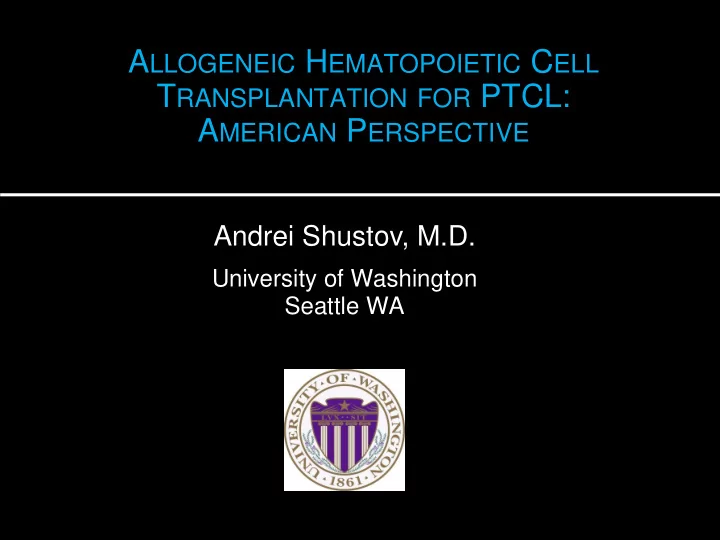

A LLOGENEIC H EMATOPOIETIC C ELL T RANSPLANTATION FOR PTCL: A MERICAN P ERSPECTIVE Andrei Shustov, M.D. University of Washington Seattle WA
A LLOGENEIC HCT IN PTCL WHO WHEN HOW
A RE A LL A LLOGRAFTS THE S AME ? Myeloablative conditioning Reduced-intensity conditioning Non-Myeloablative conditioning Cord blood transplants
Successful Treatment of Mature T-Cell Lymphoma with Allogeneic Stem Cell Transplantation: The Largest Multicenter Retrospective Analysis Neha Mehta-Shah, MD 1 , Stephanie Teja 1 , Yu Tao, MD 2 , Amanda F. Cashen, MD 1 , Anne Beaven, MD 3 , Matthew A. Lunning, DO 4 , Onder Alpdogan, MD 5 , Pierluigi Porcu, MD 5 , Mackenzie Wiggin 6 , Kevin W Song, MD 7 , Musa Alzahrani, MBBS 7,8 , Parastoo B. Dahi, MD 9 , Alison J. Moskowitz, MD 9 , Steven M. Horwitz, MD 9 and Eric D. Jacobsen, MD 6 1 Washington University in St. Louis, St. Louis, MO; 2 Siteman Biostatistics Shared Resource, Washington University in St. Louis, St. Louis, MO; 3 University of North Carolina, Chapel Hill, NC; 4 Univerisity of Nebraska, Omaha, NE; 5 Thomas Jefferson University, Philadelphia, PA; 6 Dana Farber Cancer Institute, Boston, MA; 7 British Columbia Cancer Agency, Vancouver, Canada; 8 King Saud University, Riyadh, Saudi Arabia; 9 Memorial Sloan Kettering Cancer Center, New York, NY
A LLO -HCT IN PTCL: P ATIENT C HARACTERISTICS Courtesy of N. Mehta-Shah and S. Horwitz; ASH-2017
A LLO -HCT IN PTCL: S URVIVAL O UTCOMES OS and PFS (N=301) PFS by Dz Status prior to HCT Time (months) Time (months) Courtesy of N. Mehta-Shah and S. Horwitz; ASH-2017
ALLO-HCT IN PTCL: H ISTOLOGY S PECIFIC S URVIVAL Courtesy of N. Mehta-Shah and S. Horwitz; ASH-2017
ALLO-HCT IN PTCL VS CTCL OS: PTCL vs CTCL PFS: PTCL vs CTCL Courtesy of N. Mehta-Shah and S. Horwitz; ASH-2017
ALLO-HCT IN PTCL: TRM AND GVHD TRM by donor type Courtesy of N. Mehta-Shah and S. Horwitz; ASH-2017
FHCRC E XPERIENCE
FHCRC E XPERIENCE 15% 65% 3-year 66%
PTCL: W HO S HOULD G ET A LLOTRANSPLANT Patients with relapsed and refractory PTCL Patients with post-autoHCT relapse of PTCL Newly diagnosed PTCL: high-risk disease (IPI* = 4-5) High-risk histology • Hepatosplenic T-cell lymphoma • G-d T-cell lymphomas • Adult T-cell Leukemia/Lymphoma*
“If we knew what it was we were doing, it would not be called research, would it?” Albert Einstein
Recommend
More recommend